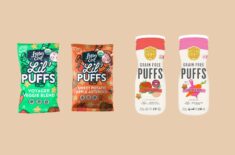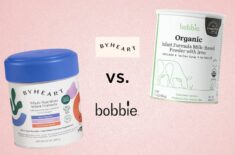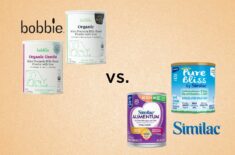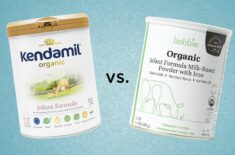Overview
As makers of fresh, organic, and convenient baby foods, Little Spoon is a startup worth noting. The company has found success by providing various nutritious food blends for babies, toddlers, and even older kids.
These are some reasons that make Little Spoon different from other commercially available products and store-bought baby foods:
- It offers organic meal delivery services
- The products are not readily available from any grocery store or retail outlet
- All products are Non-GMO Project Verified
- Little Spoon organic baby foods don’t have fillers, preservatives, or artificial flavors
- It features rotating menus that change every season
- No extreme heat processing.
- All products go through HPP (high-pressure processing). This cold-pressure process can kill harmful bacteria without extreme heat; so, it keeps the nutrients, vitamins, texture, color, and flavors intact.
Little Spoon chooses the baby food sent to you instead of giving parents the choice of picking the products they want to order.
Meal planning is done with pediatricians, nutritionists, and dieticians to help provide your baby with age-appropriate foods that can best support brain and body development for each milestone.
So, what is Little Spoon, and what products are available? Does it really make fresh baby food from organic ingredients? Are there products to help promote children’s health and provide nutrition for babies and older kids? Continue reading to find out.
All About Little Spoon: How It Started
Little Spoon co-founder Michelle Muller explained that as a single mother with three children, it was difficult for her to keep up with their needs, especially when the youngest began eating solid foods. (1)
She has always loved cooking, but keeping up with her children’s needs became a struggle. It was then that she realized the need for a company that can offer fresh baby foods to help parents like herself.
Muller explained:
“I personally made all the food for my kids, and it was very stressful. I lost a lot of sleep over it, but I had a moment of clarity when I thought, ‘If I’m having this struggle, then surely other parents are, too.’
I think it’s ridiculous that we’re living in this amazing, modern society filled with incredible technology at our fingertips [and yet there are relatively few modern solutions] when it comes to feeding your child.”
So, Muller launched Little Spoon in 2017 as a startup company that offers organic meal delivery services. It’s based in New York and was founded along with Ben Lewis as CEO, Angela Vranich as chief product officer, and Lisa Barnett as CMO (chief marketing officer).
Their mission is to “enhance the overall health of the general public by starting in the formative babyhood years.”
What Makes Little Spoon Different
All Little Spoon products (BabyBlends, Plates, vitamins, and natural remedies) don’t have:
- Additives.
- Added sugars.
- Preservatives.
- Food coloring.
- Artificial flavors.
- Fillers.
- Hormones.
- Heavy metals.
- GMOs (genetically modified organisms).
A Certified Organic Company
Although Little Spoon is based in New York, the company’s own kitchen is in Southern California.
The company directly partners with farms and agricultural producers for fresh ingredients throughout the year.
Because it’s a company making baby foods, Little Spoon wants to make sure that all the products are organic and made with the highest levels of safety and cleanliness.
It’s now certified organic and has certifications from the following authorities:
USDA (United States Department of Agriculture) Certified Organic
The USDA Certified Organic label means that the organic foods are sourced from farms that are regularly inspected to ensure they follow strict federal guidelines on growing food. These farms must meet the standards for: (2)
- Soil quality (no prohibited substances for three years before harvest)
- Animal raising practices (100% organic feed and forage, with no antibiotics or hormones)
- Pest and weed control (without synthetic fertilizers and pesticides)
- Use of additives (no additives used, including artificial preservatives, colors, or flavors)
- No GMOs (genetically modified organisms)
Non-GMO Project Verified
While USDA certification is run directly by the US government, the Non-GMO Project is an independent, non-profit organization that evaluates products for GMO avoidance. (3)
Features of Non-GMO Project Verified products: (3)
- Produced without genetic engineering
- Ingredients are not derived from GMOs.
- Complies with strict provisions for testing, traceability, and segregation
- Regularly tested for non-GMO compliance
Meal Plans & Ordering
There are two types of meal plans from Little Spoon:
- BabyBlends – pureed fruits and vegetables for babies and toddlers
- Plates – set meals for older children
In ordering from Little Spoon, you’ll need to enter the following information:
- Baby’s name
- Baby’s date of birth (to determine age)
- Types of food the baby regularly eats
- The milk your baby drinks (breast milk or formula)
- Baby’s food allergies
- Baby’s meat preferences & other important information (no meat, no dairy, etc.)
Your baby’s needs and personal developmental history will be used to create a suitable meal plan.
Little Spoon also provides regular food recommendations to support your child’s health and growth needs. You’ll also be provided with more information about what’s happening in each milestone of your child’s developmental stage.
Foods for Picky Eaters
Little Spoon can help new parents introduce their children to a wide variety of foods that may help prevent them from becoming picky eaters.
But there are also kid’s meals designed for picky eaters, with plenty of vegetables on each plate.
Little Spoon doesn’t refund food packs (baby foods, toddler meals, or kid’s meals) that your child refuses to eat.
Though it can be frustrating to see your child reject the food you paid for, Little Spoon recommends that you keep trying until your child develops a taste for the new food. The company explains that babies might need to taste new food around 15 times before recognizing and developing a taste for it. (4)
Little Spoon also recommends letting big kids pick the meal kit because it can make them feel empowered to be part of the meal planning process.
Nutrition Facts and Ingredients
- Little Spoon only uses high-quality organic ingredients for healthy meals.
- All Little Spoon products are certified organic baby food by the USDA and CCOF (California Certified Organic Farmers).
- All baby blends are free from any big-eight allergens (milk, tree nuts, eggs, peanuts, fish, crustacean shellfish, wheat, and soy). Note that Plates (for big kids) can have allergens, but they’re indicated on the label.
- All products are meat-free.
- Protein sources for the products come from plants (legumes, grains, and seeds)
- Many of the products are made of superfoods or low-calorie foods packed with a lot of nutrients.
Little Spoon offers single-ingredient and multiple-ingredient veggie and fruit purees made from the following, depending on the season:
- Apples
- Avocados
- Avocado oil
- Bananas
- Basil
- Beets
- Blueberries
- Broccoli
- Buckwheat
- Butternut squash
- Carrots
- Chia seeds
- Chickpea
- Cinnamon
- Coconut milk
- Dates
- Flax oil
- Gingers
- Hemp
- Kale
- Mangoes
- Mint
- Peas
- Pears
- Pineapples
- Pitaya
- Prunes
- Pumpkin seed
- Quinoa
- Spinach
- Raspberry
- Red bell pepper
- Rhubarb
- Rosemary
- Spirulina
- Strawberry
- Strawberry and
- Sweet potatoes
- Turmeric
- Vanilla
- Wheat germ oil
- White beans
- Zucchini
Nutrition facts (% Daily Values) for the Strawberry Rhubarb blend (contains rhubarb, strawberries, coconut milk, banana, butternut squash, and vanilla):
- Calories: 80
- Fats: 3g, 10%
- Total carbohydrates: 15g, 16%
- Dietary fibers: 2g
- Proteins: 1g, 9%
- Calcium: 15%
- Vitamin A: 70%
- Magnesium: 30%
- Vitamin C: 35%
Nutrition facts (% Daily Values) for the Butternut Squash veggie puree:
- Calories: 50
- Fats: 0g, 0%
- Carbs: 13g, 14%
- Fibers: 2g
- Proteins: 1g, 9%
- Potassium: 60%
- Vitamin C: 50%
- Vitamin E: 30%
- Vitamin A: 700%
Nutrition facts (% Daily Values) for the blend with strawberry, basil, beet, pear, and chia:
- Calories: 60
- Fats: 1g
- Carbs: 13g
- Fibers: 4g
- Proteins: 1g, 9%
- Potassium: 35%
- Vitamin C: 45%
- Folate: 70%
- Vitamin B6: 20%
- Calcium: 10%
Kid’s Meals
What Age Are Little Spoon Plates For?
These are menu options for children up to 10 years old:
- Beet superfood sliders (plus peas and sweet potato carrot poppers)
- Broccoli bites (plus green beans and sweet potato carrot poppers)
- Cauliflower croquettes (plus veggie millet poppers and carrots)
- Cheesy black bean pupusas (plus Spanish veggie rice)
- Chicken potstickers (plus quinoa veggie stir fry and edamame)
- Chicken super nuggets (plus broccoli and sweet potato carrot poppers)
- Chicken teriyaki (plus quinoa “fried rice”)
- Gluten-free cauliflower gnocchi (plus veggie marinara sauce)
- Mac and three-cheese (plus invisible carrots and butternut squash)
- Penne and kale turkey meatballs (plus broccoli and veggie marinara sauce)
- Southwest chicken fajita bowl (plus Spanish veggie rice)
- Spaghetti and turkey meatballs (plus kale and broccoli)
- Spinach and cheese ravioli made (plus veggie marinara sauce)
- Three cheese tortellini and kale pesto
- Three cheese egg bites with sweet potato hash
- Turkey kale sliders (plus carrots and millet poppers)
- Turkey rice balls (plus sweet potato mash)
- Turkey taco bowl (plus Spanish veggie rice)
- Veggie tenders and broccoli
All baby blends are free from any big-eight allergens but Plates (for big kids) can have them and are indicated on the label.
Nutrition facts (% Daily Values) for the chicken potstickers:
- Calories: 240
- Fats: 7g, 9%
- Carbs: 31g, 11%
- Fibers: 5g, 18%
- Proteins: 14g
- Potassium: 6%
- Iron: 15%
- Vitamin B6: 20%
- Calcium: 4%
- Dietary fiber: 18%
Little Spoon also offers these dipping sauces with no preservatives and additives:
- Avocado crema (a guacamole dip with nutritious ingredients)
- Creamy dill ranch (with Greek yogurt)
- Honey mustard (with honey and apple butter)
- Soy glaze (an Asian-inspired dumpling dipper)
- Veggie ketchup (butternut squash, carrots, and spinach)
Other Features
- BabyBlends (pureed baby food) start at $2.75 per meal.
- Little Spoon charges flat-rate shipping costs: $5 for BabyBlends; $6 for Plates (kid’s meals)
- After your first order, Little Spoon delivers your subscription every two weeks.
- Little Spoon offers vitamins & probiotics.
- Natural remedies for common ailments are also available.
- The vitamin boosters and natural remedies come in foil packs that let you easily mix these into your baby’s food.
- Like the Little Spoon baby foods, these vitamins and natural remedies are sugar-free, preservative-free, and natural.
- Little Spoon uses BPA-free, non-toxic plastic tubs. BPA (Bisphenol-A) is a toxic often used in commercial plastic manufacturing
- Little Spoon offers different customer service options: call, text, chat, or email support.
Pros & Cons
Pros
- All baby foods and kid’s meals are made from fresh, organic ingredients.
- Meal plans are tailor-made for your baby with the help of pediatricians and nutritionists using tried-and-tested scientific methods to meet your baby’s needs.
- Kid’s meals are designed for picky eaters and have some ‘invisible’ vegetables.
- Natural remedies, probiotics, and vitamins are also available.
- All subscription plans are delivered every two weeks, with ice packs to keep the foods fresh.
Cons
- Little Spoon doesn’t let parents choose what foods are sent to babies. Some parents complain about their babies not liking some of the foods they received.
- There’s no refund for foods your baby refuses to eat.
- Little Spoon Baby Foods only offers purees, no finger foods.
- Little Spoon Plates (kid’s meals) might contain allergens, but these are indicated on the label.
Alternatives to Little Spoon
There are some alternatives to Little Spoon:
-
Serenity Kids
-
Cerebelly
-
Once Upon A Farm
-
Amara
Little Spoon Vs. Yumi: Which One Is Better?
Some reasons why Little Spoon is better than Yumi:
- Meals are tailor-planned by nutritionists and pediatricians for each baby.
- Little Spoon has set meals for older kids, natural remedies, vitamins, and prebiotics.
Some reasons why Yumi is better than Little Spoon :
- You’ll have more control over your order, so you can choose the foods that your baby likes eating.
- Yumi offers finger foods to help with baby-led weaning and feeding.
- Fresh baby foods are delivered every week (Little Spoon delivers every two weeks).
What Customers Say
Positive Little Spoon Reviews
“We received our Plates today and I am so impressed with everything! The packaging, instructions, and Kennadie went CRAZY for her ravioli! She loves food, but I’ve never seen her lick a plate clean like that! It was hilarious! We loved Little Spoon as her first bites and I was very excited when I got the email about your new Plates. Thanks for making yummy fresh food for my little one!” – Reviewer on Little Spoon website.
“Prior to Little Spoon, I made all of Olivia’s baby food. I wanted to be sure she was getting the best of the best. After being introduced to Little Spoon, I am no longer spending so much time each Sunday making food for the week.” – Reviewer on Little Spoon website.
“Plates has truly been a Godsend. I am in late stages of a severe chronic illness. I care so much about the food my daughter gets… however, I am not physically able to cook the way I would like. Plates has allowed all of that to change. I am so thankful for Little Spoon!” – Reviewer on Little Spoon website.
Negative Little Spoon Reviews
“It seems like an absurd waste of money… You could spend significantly less getting a food processor or blender and buying fresh items at your local grocery store. You can use this as an opportunity to introduce new foods to your kid, rule out any potential allergies, and not waste money on food she dislikes.” – Reviewer on Reddit.
“Some of their blends contain 3+ ingredients, so if you’re committed to introducing each new food separately, you’ll need to figure out a way to do that. Sometimes the 2-day shipping actually takes 3-4 days. It’s kind of expensive, but my baby likes their stuff.” – Reviewer on Reddit.
“The turkey kale sliders with millet poppers and carrots food tastes bad. Honestly, this whole meal tasted like airplane food. The sliders were rubbery and not very good, and the carrots were mushy. I appreciate that Little Spoon tried to make a healthier, millet version of tater tots, but these lacked crunch and were not a hit with either of my kids.” – Reviewer on Reviewed.
FAQs
Do You Warm Up Little Spoon Baby Food?
You can warm the pureed food in a pot on a stove. Both the purees and the kids’ meals can be heated in the microwave.
Does Little Spoon have meat?
The company claims that their baby food products are free from toxic heavy metals.
Does Little Spoon Have Meat?
The baby blends are all plant-based, but the kids’ meals (Plates) may have meat.
Recent Baby Food Safety Issues
Many parents are concerned after recent Congressional baby food safety reports showed that several popular brands contain alarmingly high levels of harmful chemicals such as arsenic.
Many are also worried about major allergens in commercial baby foods and supplements.
Some parents choose to make homemade baby foods for their baby’s first bites, while others buy organic purees from companies they trust, such as the baby food subscription company Little Spoon.
REFERENCES
(1) https://www.uschamber.com/co/good-company/growth-studio/little-spoons-co-founder-michelle-muller
(2) https://www.usda.gov/media/blog/2012/03/22/organic-101-what-usda-organic-label-means
(3) https://www.nongmoproject.org/gmo-facts/non-gmo-project-verified-faq/
(4) https://isthisnormal.littlespoon.com/starting-baby-solids/












